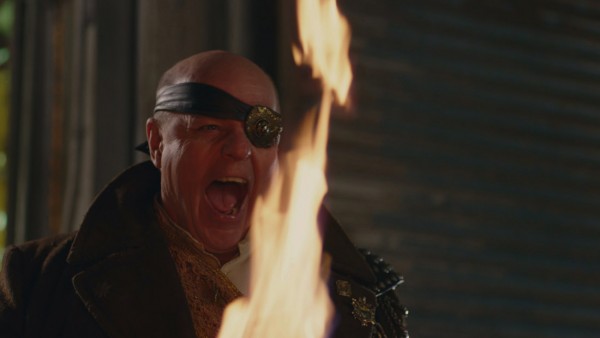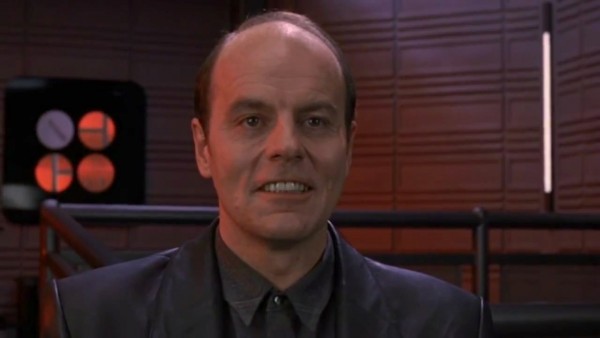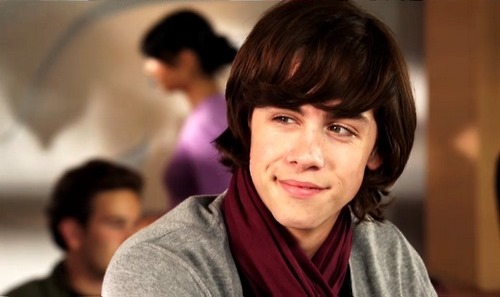
Here’s something: I maybe asked Michael Ironside a total of four questions over the course of this 20 minute interview. The man is a raconteur, but more than that, I think he was still working over the film (Turbo Kid) in his head. He’d only seen it a day or so before we spoke and you can hear him coming to grips with the finished product throughout the interview. I tried to wedge myself in a few times, but to only occasional avail. Fine by me. Michael had a lot of interesting things to say about his technique and why he’s changing things up in his advanced age. He also compares his face to a scrotum, constituting my favorite interview moment in my short career.
Turbo Kid makes its world premiere at Sundance next Monday and I expect I’ll be seeing it sometime after that. If it means anything to you, Michael really seemed to like it and as he says, he wouldn’t promote the movie if he didn’t like it.
That said…
Miles Lemaire: Hey, Michael. How are you?
Michael Ironside: Pretty good, Miles. Where are you?
Miles: Long Beach.
Michael: You’re in Long Beach?
Miles: Yeah, Long Beach, California.
Michael: Yeah, I know Long Beach. I live right up in Laurel Canyon. Right now I’m in mid-Ontario, Canada and I think it was 16 degrees below zero this morning.
Miles: Ah! It’s gorgeous today, very sunny, not at all like January weather. But we’re lucky.
Michael: Yeah, I’ll be home in about two days. I’m not much of a Canadian anymore, I can take winter for about a week.
Miles: Are you making the trip out to Sundance?
Michael: Yeah, I’m getting prepped for Sundance. Sundance is a joke compared to this place. Yeah, it’s cold. You can’t wear anything fashionable and expect to survive around here. People just look at you like you’re insane. Uggs are like weather-suicide. So we’re gonna talk about Turbo Kid?
Miles: We are gonna talk about Turbo Kid.
Michael: But you’ve not seen the movie.
Miles: Yeah, unfortunately they’re saving all of their screeners until after the film debuts at Sundance.
Michael: I just saw it myself, I think it was yesterday or the day before yesterday. I was pleasantly surprised. It’s kind of — god, I’ve been trying to find a way to put this — it keeps reminding me of, like, Repo Man. It almost has a handmade feel to it.
Miles: Oh, that’s cool to hear!
Michael: And I have to tell you, the first three or four minutes were kind of shocking, because it was not what I expected. It had a much more — and I use this word — it’s not amateur, I’m trying to think of something… It’s almost like there’s an innocence in it. At first when I saw it I said, “my god, what are they doing here?” And then a few more minutes went by and it’s just charming as hell.
Miles: Would you maybe say it’s like outsider art?
Michael: It’s not your mainstream film. If anyone goes in here expecting Terminator 3 or 4, they’re going to be grossly disappointed. This is not some slick, high-tech, crash and burn piece of sci-fi. This is very, very — Road Warrior without the cars is even pushing it — that’s not true. That’s a very slick, powerful action driven kind of story. This is like a comic book. This is like a kid’s comic book brought to life and there’s an absolute charm about it that’s just amazing. I’m trying very hard not to let anything out of the bag.
Miles: No, that’s fine.
Michael: Laurence Leboeuf, a French-Canadian actress, when you see her…you know how huskies have grey-white eyes?
Miles: Right.
Michael: She has those! Those are not contacts! Those are her’s! (Laughs) She plays Apple, the female lead in the film. I’m trying to talk about the story without giving it away. But she’s Munroe Chambers’ girlfriend in the story. And Munroe is a wonderful surprise. I knew nothing about him. I’d read this script and talked to the directors over Skype and said, “what do you want to do with it?” And they were all just joyously enthusiastic, the three of them. But we can talk about them later on, the three directors.
Miles: Yeah.
Michael: But I knew none of the other cast members going into this. Well no, who did I know? I did not know Aaron Jeffery. I knew Romano Ozari because in Quebec we’d done some work before. But I loved the script, I loved the idea of it, I said, “is this gonna be done tongue in cheek?” And they said, “no, no, we want to create a reality that we all stay true to.” You know? It’s a post-apocalyptic world set in 1997 or 1993. Instead of cars, everyone rides around on bikes and water is the most valuable commodity, which my character controls. And they were doing it very true to a comic book format and characterization. And I said, “okay.” So when I got there, I expected them to shoot this and edit it like a comic book, you know what I mean? The storyline is true to the comic book, but the shooting is as naturalistic as they possibly could do it. And it does not apologize for itself. It is absolutely charming. There’s no winking at the camera, you know what I mean? Tongue in cheek? It’s absolutely committed and authentic. I’m talking around things here because I don’t want to give away storylines.
Miles: No, that’s okay. My question would be: since you were worried about it possibly being tongue in cheek…
Michael: No, there is none of that.
Miles: No, I mean, once you went into the meeting that was your fear and obviously it didn’t turn out that way. But do you get a lot of offers for films like that these days because of your history with the genre?
Michael: Oh absolutely. I get about three or four scripts a week and a lot of them want me to parody myself or pass comment on myself. I’m just not interested in that. How do I say this? Look, I’ll be 65 next month. I’ve been doing this for forty, forty-five years. I’m really interested in pushing the limits of what I do now and I’ve been doing that for the last ten years. I’ve had a couple of brushes with cancer over the last fifteen years. And I’m not interested in doing something I’ve done before, I really want to try new things. For example, they offered me a role a few weeks ago for this TV series, which — I won’t mention it, because I don’t want to prejudice it — but I said, “I’ll come in and show you…” And they said, “no, no, you don’t have to audition.” But I said, “no, I’ll show you what I want to do.” Because they wanted a stereotypical kinda Michael Ironside heavy to play this authority figure and I wanted to play him slightly eccentric. And I wanted him to come off as quite mad, but in a joyous way. So I came in and showed them the way I wanted to do it and they had a conference meeting and the money came out and said, “we’re nervous, because we’re packaging this in a certain way and if we don’t get the results we want for these episodes, we’re gonna lose a lot.” And they said, “so we’re gonna pass, would you consider doing it this way?” I said no. I’m not — I don’t know how to say this — look, my time on this rock is limited and I want to find out how long my arm is in certain areas and that’s what I’m trying these days. This character Zeus in Turbo Kid is an absolute caricature. He’s not meant to be realistic, he’s meant to have a certain joi de vivre and he’s doing it all basically in rags and leftover clothing. He’s a pompous autocrat. There’s a lot of metaphors in this film. I never talked to the directors about it, but I assumed they were doing it on purpose. Political metaphors about water rights and children having relationships with animated objects rather than other human beings, you know what I mean?
Miles: Yeah.
Michael: And it’s also in an area where children are left to their own devices to scavenge among the technology for themselves. You have a character that’s scavenging about in the leftovers of society to sustain himself. And they don’t hit this shit with a baseball bat. They’re very gentle about it. It almost has a Degrassi… I didn’t know who Munroe Chambers was, I just knew he was a good looking guy, I talked to him on Skype. I thought, okay he’s got some talent. I came back from shooting the film and I have a 16-year-old who was fifteen at the time and she was sitting around with a bunch of her friends from school and she said, “what were you doing?” I said, “this movie called Turbo Kid.” She said, “oh yeah, anyone we know in it?” I said, “I don’t know, Aaron Jeffery, Munroe Chambers.” And one girl started to shake. Another one got up and walked right into the edge of the flat screen. And I went, “are you guys alright?” I thought she was having an epileptic fit. They’re all Degrassi Street freaks. And Munroe was like their kind of… one girl started crying. Do you know Degrassi….
Miles: Do you get to pull that with your daughter that often?
Michael: Well my daughter is like, “whatever.”
Miles: And yes, I do know Degrassi, to answer your question. My sister was a big fan of it and she’s a couple of years younger than I am and watched it a lot when it was rebroadcast here in the States. It was the era when Drake was on, so maybe about ten years ago now, so I’m not up to speed on the current cast.
Michael: But it’s still going! He (Munroe) just spent four or five years on Degrassi Street. He’s this teenage heartthrob and he’s wonderful. All of the actors committed to this artificial, real world. I mean, we knew we were shooting a comic book, but we didn’t over act. We all basically committed to these characters and to be as true to the story structure as possible. And I’m telling you, the film has an amazing charm to it.
Miles: Well I trust you, Michael, because when you mentioned earlier that there’s a typical, Michael Ironside-type of heavy that people look for in you, I never feel like you’re phoning it in. I rewatched Scanners when the Criterion Collection Blu-ray came out and watched your interviews in there too and I’ve always seen the fine, classically trained acting at the heart of what you’re doing.
Michael: Well thank you. This character is very Shakespearian in a way with his language. And look, I’m not saying that Turbo Kid is a Shakespearian structure, I’m talking about the kind of leery, King Lear kind of broadness of this character. The wailing at the floorboards and the ceiling. This character does a lot of that. I do things like, I tie someone’s intestines to a bicycle and pull them out and I have a fellow who runs around in a styrofoam skull mask that’s supposed to be metal. Skeletron or Skeletor, I think his name is. Played by a New Zealand actor. I mean, so this is very over the top and I go through most of the movie with this eye patch and this bloated kind of Zuesian authority in this post-apocalyptic Repo Man world, you know? I had a lot of fun. And you’ve gotta remember, we shot it in February anti was friggin’ cold. It was COLD. There were a couple of times when I looked at my face and thought, is that what I look like? Like, I’m old and my skin’s kind of like, loose. So the skin on my face would sag in an area. Your skin doesn’t have this resilience to it as you get older. And I remember looking at the playback and thinking, I look like somebody’s old boot with scrotum material on the side of my face! But five minutes into the film I was feeling a little uncomfortable and thinking, this is just not what I expected. And then about ten minutes in — and I watched it with my sister and she came in and said, “what are you watching? “It sounds like a comic book, is that an animated film?” — and I said, “no, here, look.” And I turned the computer and she sat down and said, “oh, cool!” My brother just said it’s like Buckaroo Banzai. It’s kind of like a backlot Buckaroo Banzai…

(Note: We get the “wrap it up” warning from the publicist)
Miles: When you say…
Michael: Well let me finish the answer. It’s like Buckaroo Banzai crossed with Repo Man crossed with… whatever, you know? I think people will enjoy it if they give it five minutes.
Miles: I enjoyed the short film that it was based on. But when you say that it’s not what you expected, what do you mean? I guess, what’s the difference between filming it and then actually seeing it?
Michael: What happens with me is, I see a story structure in my head. As an actor, I insert what I’m creating into a story structure and as long as I’m not corrected, I think I’m doing okay. So I go through with a certain amount of joi de vivre or whatever I’m doing with this character. And I create — this is going to get really esoteric — but the story is like a building that I wander through and it’s my building and it’s my creation, my kind of fantasy creation that allows me to act in that thing. It gives me an entrance and an exit and if it’s working for the director, it works. I forget that it’s only one component of a much larger story and other people are building their own structures. You put it all together and you’ve got the master story-tellers and in this case, three directors. Francois adapted a lot of the technology. Yoann worked almost exclusively with the actors and Anouk held them all together. Anouk was kind of reigning in the three of them. They were all very, very approachable, but I forget that they’re the architects of the story, so when I saw it, it was not the architecture I expected. I had a preconceived idea of what it was going to be. It has some low-budget charm to it that I think is wonderful. And every department from the editing, to the over-the-top special effects, you have people using f-bombs here and there. Heavy language, so it’s not a children’s film, but at the same time, it pulls no punches. I think it’s well worth sitting through, it really is. And I don’t always say that about a film. If I don’t like a film, I don’t support it. (Laughs)
Miles: I’m very excited to see it eventually.
Michael: Well, like I said, you’re not seeing Terminator 4, here.
Miles: Well I hated Terminator 4, so that’s fine by me (I said, forgetting that Michael co-stars in that film).
Michael: Fantastic! Go in expecting Repo Man and you’ll be happy.
Miles: That sounds so much better to me, you have no idea.
Michael: But you know, Repo Man passed comment on itself in its storytelling and this doesn’t. I just think they didn’t try to fake it. They went out and had fun, they told the story they wanted to tell and we all kind of bought into their image and I think it’s wonderful, I really do. I think it’s also what Sundance is all about.
Miles: Yeah, I agree.
Michael: It’s about a specific kind of story telling and thumbing its nose at commerciality.

